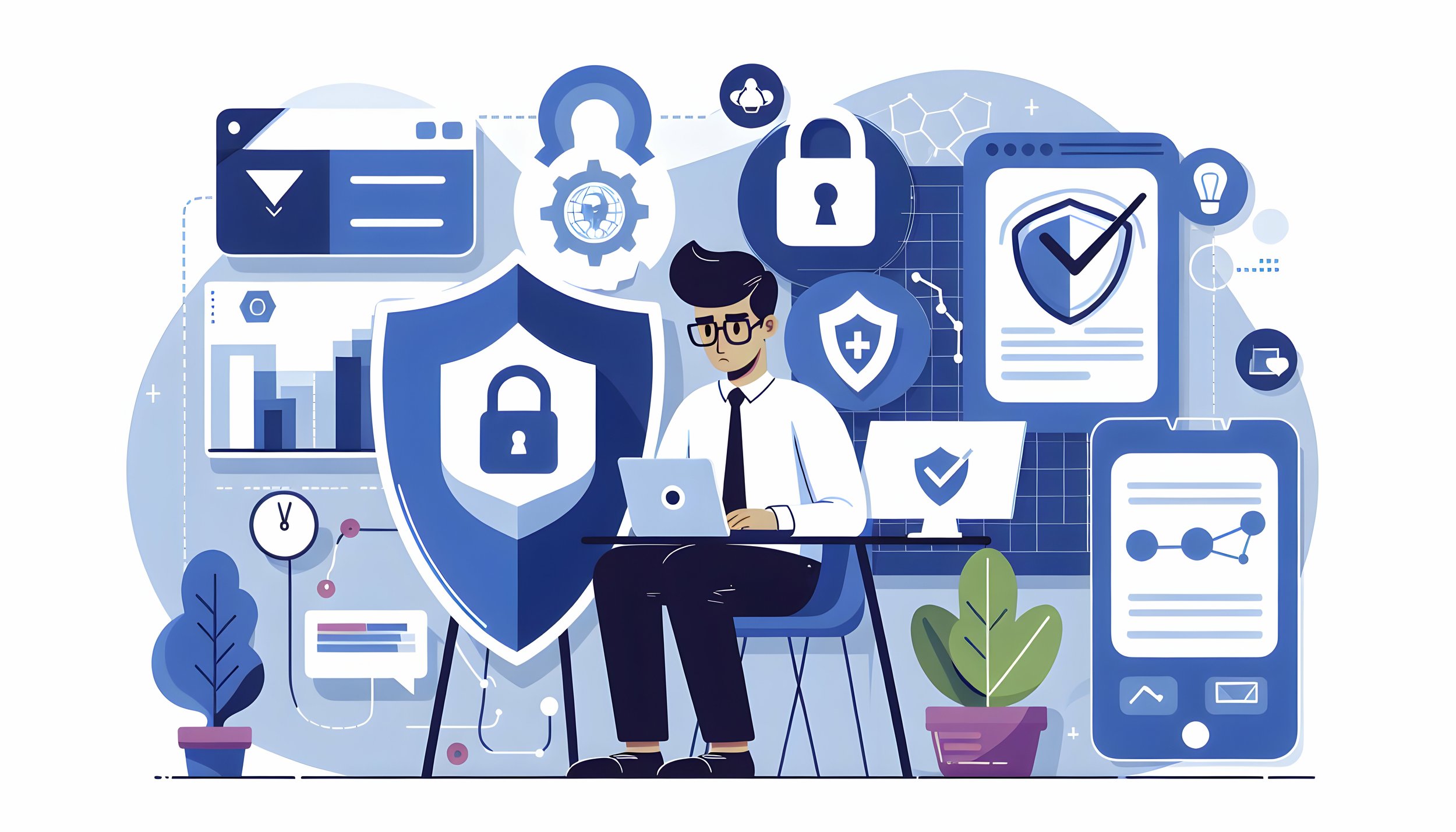I’m excited to share that my article “What to Do if Your Social Media Is Hacked” was recently published on ABA’s “The Marketing Issue” for Law Practice Management!
For those of you who can’t get behind the paywall, I’m allowed to share it below (after it had been published on the ABA’s webpage). Note the pictures are my own AI generation.
Enjoy!
As a legal professional, your social media presence is more than just a personal outlet—it's an extension of your professional identity and a critical tool for networking, client communication, and brand building. When your social media account is compromised, the consequences can be far-reaching, affecting both your personal and professional life. Social media security is crucial, and legal professionals should take these steps to address hacks across various platforms.
The Professional and Personal Impact of Social Media Hacks
Professional consequences. A hacked social media account can severely damage your professional reputation. Unauthorized posts or messages sent from your account could potentially impact your work by violating client confidentiality or by spreading misinformation about ongoing cases. If the hack involves personal comments, it could damage relationships with colleagues and clients and undermine your credibility in the legal community. For judges, a compromised account could raise questions about impartiality and potentially influence ongoing cases. For lawyers, it could lead to loss of clients and damage to the firm's reputation.
Personal ramifications. On a personal level, a social media hack can be equally devastating when it involves identity theft or financial fraud. Additionally, do not underestimate the potential damage to personal relationships or the emotional distress and loss of privacy that may result.
The interconnected nature of personal and professional lives in the legal field means that personal social media breaches can have professional consequences and vice versa.
Ethical Considerations and State Bar Issues
Social media hacks pose significant ethical challenges for legal professionals. Many state bars have specific rules regarding attorneys' use of social media, and a compromised account could lead to unintended violations if negligence on the lawyers’ part is involved. Keep in mind that many states have adopted an ethical duty of technological competence.
There are many possible rules implicated if a hack occurs. These may include:
Confidentiality. Unauthorized access to your account could lead to the disclosure of confidential client information, violating ABA Model Rule 1.6[3].
Advertising and Solicitation. Hacked accounts might post content that violates rules on lawyer advertising and solicitation. See ABA Model Rules 7.1, 7.2 and 7.3.
Competence. Failure to adequately secure your social media accounts could be seen as a lack of technological competence, which is increasingly considered part of a lawyer's duty of competence under ABA Model Rule 1.1[8].
Communication. Inappropriate messages sent from a hacked account could violate rules on communication with clients, opposing parties or the court. See ABA Model Rules 1.6, 3.3, 4.1, 5.1, 5.2 and 5.3.
Supervision. Law firm leaders may be held responsible for the social media conduct of their subordinates, even in cases of hacking, under ABA Model Rules 5.1, 5.2 and 5.3.
Any of these violations may also lead to ABA Model Rule 8.4 for misconduct leading to the failure of maintaining the integrity of the profession.
Given these ethical implications, it's crucial for legal professionals to not only secure their accounts but also to act swiftly and transparently in the event of a hack.
Steps to Take When Your Social Media Is Hacked
Immediately change your password on the affected account and any other accounts that share the same password. Use a password manager like Keeper, NordPass, Bitwarden Bitdefender or Dashlane to make complex passwords that are not easy to hack. A password manager securely stores your credentials, synchronizes them across your devices, and restricts access to only those you authorize.
For additional security, enable two-factor authentication (2FA) on all your social media accounts. 2FA is an extra layer of security that requires users to provide two different pieces of evidence to prove their identity when logging into an account. In addition to a password, 2FA typically requires something the user physically possesses, like a smartphone to receive a verification code, or something unique to the user, like a fingerprint. This makes it much harder for unauthorized people to access accounts, even if they manage to obtain the password.
You also need to consider outside relationships. Review and revoke access for any suspicious third-party apps connected to your account. Be cautious about accepting connections or friend requests. Inform your professional network, clients and colleagues about the hack to prevent them from falling victim to any malicious content or requests.
Some states require you to contact your state bar association(s) depending on the severity of the breach. Contact your bar hotline or private counsel if you have questions about what to do regarding your state bar obligations. You likely have obligations to inform any clients potentially impacted.
Make sure to document everything. Keep a record of unauthorized posts, messages or changes made to your account. This documentation may be necessary for reporting to the platform, your state bar or law enforcement.
Platform-Specific Steps
Follow these steps if your account on any of your outside platforms is hacked.
Facebook
Visit Facebook's Hacked Accounts page and follow the prompts.
Use the “Someone else got into my account without my permission" option if you're locked out of your account.
Review your account's login history and update/change your security settings.
Instagram
Visit Instagram’s Hacked Accounts page and follow the prompts.
Use the “My account was hacked" option if you're locked out of your account.
Review your account's login history and update/change your security settings.
LinkedIn
Report the compromised account to LinkedIn immediately.
If you can still access your account, change your password and review recent connections and activity.
If you are locked out, use LinkedIn's account recovery process.
Review and update/change your privacy settings once access is restored.
X (formerly known as Twitter)
Request a password reset via email or phone number by going to X” login and click on Forgot password?
If unable to reset, contact X support directly.
Review and revoke access for any suspicious third-party apps.
Review and update/change your privacy settings once access is restored.
Post-Recovery Actions
To prevent future hacks, take the following steps. Begin with a security audit. Review all your social media and online accounts for any signs of unauthorized access or suspicious activity. You may wish to, or need to, hire a professional to assist you. Change your security questions and answers on all accounts. As with your computer, use a password manager to create and store strong, unique passwords for each account. Finally, adjust your privacy settings to limit the information visible to the public.
Preparing for the future, educate your team. If you're in a leadership position, conduct training sessions on social media security for your staff. Consider setting up trusted contacts who can help you regain access if you are locked out. In severe cases, consult with a cybersecurity professional to ensure your accounts and devices are secure.
Preventive Measures
First and foremost, be transparent about the breach and any potential impacts on client confidentiality or ongoing cases.
To minimize the risk of future hacks, regularly update your passwords and use a password manager. Current best practices include using a password that is between 15 and 20 characters, which may alleviate the need to update passwords. Be cautious about clicking on links or downloading attachments from unknown sources. Keep your software and apps updated to patch security vulnerabilities. Use separate email addresses for personal and professional social media accounts. - Use a virtual private network (VPN)––it’s a best practice, but particularly necessary when accessing social media on public Wi-Fi.
Reporting to Relevant Authorities
Depending on the severity of the hack and any resulting damages, you may need to report the incident to your state bar association, law enforcement agencies, clients or other affected parties and your firm's IT department or cybersecurity team.
Rebuilding Trust and Reputation
After securing your account, focus on rebuilding trust with your network. First, post a clear explanation of the hack and the steps you've taken to secure your account and your client’s personally identifiable information (PII) if affected.
Going forward, consider sharing lessons learned to help others in your professional network improve their social media security. Be proactive in monitoring your online reputation and addressing any lingering concerns from clients or colleagues.
Safeguard Your Professional Reputation
For legal professionals, a social media hack is more than just an inconvenience—it's a threat to your professional integrity and ethical standing. By understanding the risks, taking swift action when compromised and implementing robust preventive measures, you can protect your online presence and maintain the trust of your clients and colleagues.
Remember, in the digital age, your online security is an integral part of your professional responsibility. Stay vigilant, stay informed and don't hesitate to seek help when needed. Your career and reputation are worth the extra effort in safeguarding your social media presence.






































